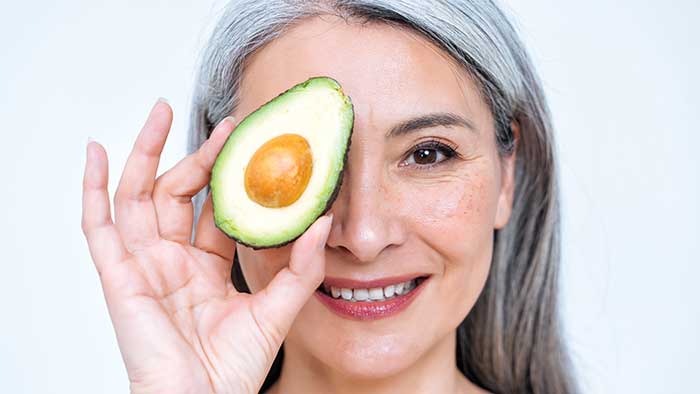As they age, women may find it difficult to maintain a normal weight, especially with the arrival of perimenopause and menopause, a period in which weight gain can reach up to 1.5 kilos per year.
Considering the peculiarities of female hormonal biology and other social aspects, it becomes challenging to build an effective weight loss process during this period and this specificity can generate a lot of anguish and doubts.
Dr. Daniela Hurtado Andrade, MD, Ph.D., endocrinologist and obesity specialist at Mayo Clinic in Jacksonville, USA, shared some valuable information to clarify doubts on this topic. Below, we highlight some myths and truths about the relationship between overweight, obesity and the arrival of menopause in women.
It is much more difficult to lose weight after menopause begins.
TRUE. It’s considerably more challenging. Hormonal changes alone are not the only cause of weight gain, which are also related to aging, lifestyle and genetics, but they contribute to body changes. The decline in estrogen levels and the drop in testosterone contribute to the loss of muscle mass. This results in less efficient calorie burning (at rest or during exercise), facilitating the accumulation of fat.
Changes can start much sooner than you imagine.
TRUE. Changes in weight are not limited to middle age or menopause. Studies indicate that weight gain begins to occur in early adulthood. Around the age of 30, muscle mass begins to gradually decrease as part of the natural aging process, intensifying during middle age due to menopause. Reduced muscle mass results in a slower metabolism, a risk factor for weight gain.
Being aware that weight-related physical changes begin before middle age can help people understand the importance of establishing and maintaining a healthy lifestyle that includes proper nutrition and exercise.
Hormone therapy can help with weight loss.
IN PARTS. Hormone therapy is not exactly for weight loss. It is generally used to treat vasomotor symptoms, which are sudden episodes of feeling hot in the face, neck and upper torso, usually accompanied by facial flushing, sweating, heart palpitations, dizziness and muscle fatigue. However, these symptoms can impose limitations on daily tasks, such as exercising and getting a good night’s sleep, essential factors for weight loss. Hormone treatment can also help redistribute the fat that accumulates in the center of the body or in the abdomen that tends to increase during menopause.
Aerobic exercise time should be increased.
MITO. When a woman reaches menopause, the loss of estrogen tends to alter the distribution of fat, which begins to accumulate more in the abdominal region. Given this increase, it is common for some women to try to increase the time spent doing aerobic exercise to reverse this process, however, this may not be the most appropriate strategy.
Aerobic exercise is important for maintaining cardiovascular health and increasing caloric expenditure, but reducing the impact of loss of muscle mass caused by both menopause and aging should be a priority. Therefore, it is necessary to adopt an exercise routine that involves resistance training combined, if possible, with high-intensity interval training, which tends to preserve muscles more.
The use of medications such as Ozempic are the quickest and most effective solution.
IN PARTS. Medications such as Ozempic reduce hunger and provide more satiety, which ends up helping patients lose around 15 to 20% of their body weight; however, they have specific indications. These are treatments that should be prescribed for people with body mass indexes (BMI) above 30 or patients who already have illnesses resulting from being overweight.
In the case of menopausal women, the medication may be interesting for patients who experience very rapid weight gain, such as 5 kilos per year, as drastic weight gain can lead to other serious illnesses such as diabetes, hypertension and other cardiovascular problems. . However, even with the prescription, we must be aware of adverse reactions. The endocrinologist points out that 30-50% of patients suffer some type of reaction, such as gastrointestinal disorders, nausea, reflux and also vesicular problems, reactions that can eventually impair the absorption of nutrients essential for health. Furthermore, there are reports of patients who used the medication and, after stopping use, noticed a change in appetite and satiety, leading to a return to their previous weight or even an increase in it.
It is impossible to reverse weight gain naturally.
MITO. The bodily changes resulting from aging are inevitable; however, with the adoption of some habits, it is possible to reduce its impact. Adopting a calorie-restricted diet (between 1400 and 1500 calories), but rich in protein, around 1 to 1.2 grams per body weight, can help stop the drastic loss of muscle mass. Furthermore, Adopting a dietary plan with less sugar, fat and processed foods and adding more fiber and natural products to meals has been proven to help women’s health.
It is also important to adopt treatments that reduce possible symptoms of menopause and that can interfere not only with sleep but also with a woman’s mood and mental health. Reducing alcohol and tobacco consumption, supplementing nutrients and vitamins such as: magnesium, zinc, vitamin K, vitamins A, C and E, and saturated fatty acids and even adopting therapies with herbal medicines and phytohormones can help women’s well-being at this stage of life.






